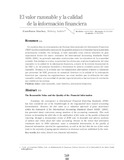Mostrar el registro sencillo del ítem
El valor razonable y la calidad de la información financiera
| dc.rights.license | http://creativecommons.org/licenses/by-nc-sa/3.0/ve/ | |
| dc.contributor.author | Castellanos S., Heiberg A. | |
| dc.date.accessioned | 2011-02-02T19:29:19Z | |
| dc.date.available | 2011-02-02T19:29:19Z | |
| dc.date.issued | 2010-12-31 | |
| dc.identifier.issn | 1317-8822 | |
| dc.identifier.uri | http://www.saber.ula.ve/handle/123456789/32323 | |
| dc.description.abstract | En nuestros días, la convergencia a las Normas Internacionales de Información Financiera (NIIF) ha sido considerada como uno de los grandes avances en el transitar hacia la anhelada armonización contable. Sin embargo, el valor razonable como criterio valorativo de gran importancia dentro del marco normativo del International Accounting Standards Board (IASB) (2005), ha generado marcadas controversias entre los miembros de la comunidad contable. Este trabajo se centra, en presentar los efectos que ocasiona la aplicación del valor razonable en la calidad de la información financiera, a través de la revisión documental de las NII F y, de las posturas favorables y detractoras de autores contables acerca del valor razonable. Destaca en la revisión que los tratamientos alternativos relativos a valoración que presentan las NII F, provocan un sustancial deterioro en la calidad de la información financiera que reportan las organizaciones, así como también que la utilización del valor razonable conduce a la necesidad de prestar especial atención a las secciones de revelación que establecen las normas. | es_VE |
| dc.language.iso | es | es_VE |
| dc.publisher | SABER-ULA | es_VE |
| dc.rights | info:eu-repo/semantics/openAccess | |
| dc.subject | Valor razonable | es_VE |
| dc.subject | Costo histórico | es_VE |
| dc.subject | Información financiera | es_VE |
| dc.title | El valor razonable y la calidad de la información financiera | es_VE |
| dc.title.alternative | The Reasonable Value and the Quality of the Financial Information | es_VE |
| dc.type | info:eu-repo/semantics/article | |
| dc.description.abstract1 | Nowadays, the convergence to International Financial Reporting Standards (IFRS) has been considered one of the breakthroughs in the long-awaited move toward accounting harmonization. However, the fair value as a valuation approach of great importance within the framework of the International Accounting Standards Board (IASB) (2005), has generated sharp controversy among members of the accounting community. This work focuses on presenting the effect due to the application of fair value on the quality of financial reporting, through a documentary review of IFRS and, in favorable and adverse positions of authors and critics about fair value accounting. Stresses in the review that alternative treatments have on IFRS valuation, cause a substantial deterioration in the quality of financial information reported for organizations, as well as the fact that the use of fair value leads to the necessity of paying special attention to disclosure sections established by the rules. | es_VE |
| dc.description.colacion | 269-282 | es_VE |
| dc.description.email | heiberg@ula.ve | es_VE |
| dc.publisher.pais | Venezuela | es_VE |
| dc.subject.centroinvestigacion | Centro de Investigaciones y Desarrollo Empresarial (CIDE) | |
| dc.subject.facultad | Facultad de Ciencias Económicas y Sociales | es_VE |
| dc.subject.keywords | Fair value | es_VE |
| dc.subject.keywords | Historic cost | es_VE |
| dc.subject.keywords | Financial information | es_VE |
| dc.subject.publicacionelectronica | Revista Visión Gerencial | |
| dc.subject.seccion | Revista Visión Gerencial: Artículos | es_VE |
| dc.subject.thematiccategory | Ciencias Económicas y Sociales | es_VE |
| dc.subject.tipo | Revistas | es_VE |
| dc.type.media | Texto | es_VE |
Ficheros en el ítem
Este ítem aparece en la(s) siguiente(s) colección(ones)
-
Visión Gerencial - Año 009 - Nº 2
julio - diciembre 2010


